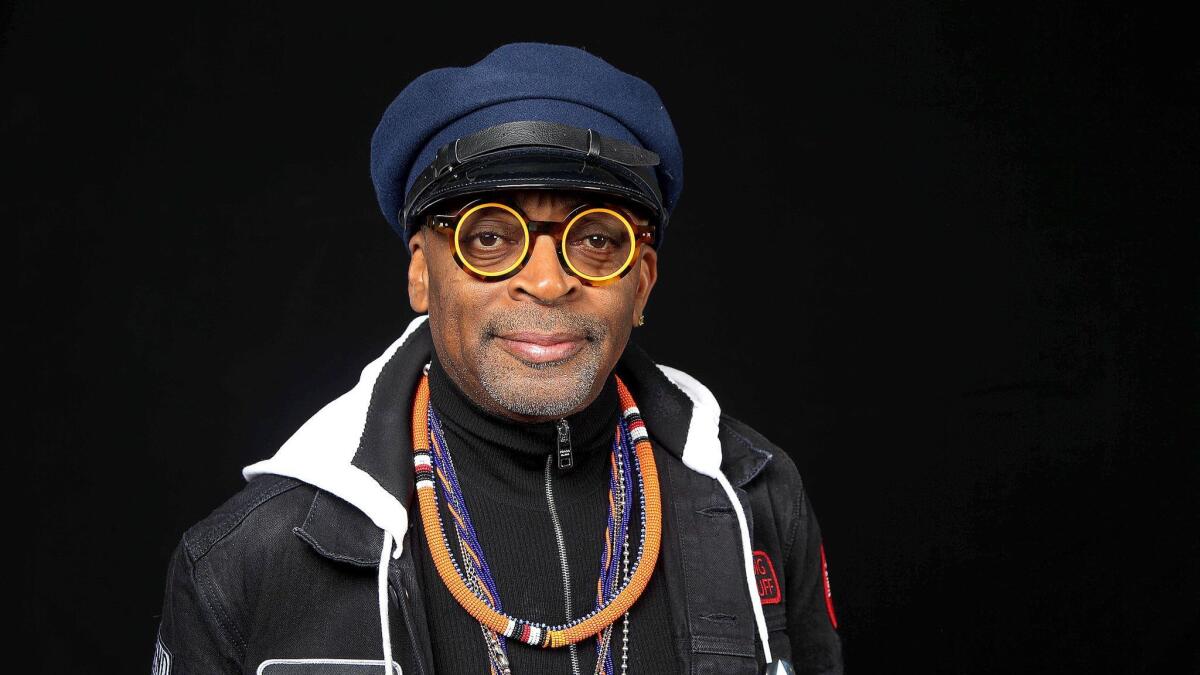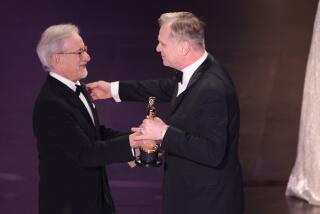Spike Lee on his first directing Oscar nomination — three-plus decades in

“Look, here’s the thing,” Spike Lee says throughout a conversation on Oscar nominations day. Even on a relatively august and portentous occasion, Lee brings his own individual energy and slicing wit, spiritedly talking about his work and his collaborators, with a hard-won wisdom regarding what truly matters.
In a recognition that seemed decades in coming, Spike Lee was nominated Tuesday morning for the Academy Award for best director for the first time for “BlacKkKlansman.” The movie was also nominated for best picture, marking the first time one of Lee’s films has been recognized in that category.
Lee was also nominated for adapted screenplay along with Charlie Wachtel, David Rabinowitz and Kevin Willmott. Adding to the film’s tally were three other first-time nominees: supporting actor Adam Driver and two of Lee’s longtime collaborators, Terence Blanchard (original score) and Barry Alexander Brown (editing).
Reached in New York City on Tuesday morning, Lee was quick to mention Blanchard and Brown.
“Honestly, I’m happy for myself,” said Lee, “but also the great Terence Blanchard, my composer, the great editor Barry Brown, who’ve never received nominations, and this one they got it, so I’m very happy for them,” Lee said.
“They are great artists in their own field, and I can’t do it alone,” Lee said. “I mean, I don’t edit. I don’t compose music. And so they’ve been a great foundation of my work.”
“I’ve heard Spike say many, many times over the years ‘It’s all about the work,’ ” Brown said in a statement Tuesday. “And this is awfully nice to get such acknowledgement for that work from my peers. When you see that the film got nominations in Best Picture, Best Director, Best Supporting Actor, Best Score, Best Adapted Screenplay, it is very obvious that I could not have gotten this honor without the amazing talent and work of the others who created ‘BlacKkKlansman’ – with a special shout out to John David Washington who is there in each and every one of these nominations.”
Although he has two prior Oscar nominations for the original screenplay of his 1989 breakout “Do the Right Thing” and his 1997 documentary “4 Little Girls,” that directing nomination has eluded Lee, from his feature debut with 1986’s “She’s Gotta Have It,” through critical and commercial successes including “Do The Right Thing,” 1992’s “Malcolm X,” 2002’s “25th Hour” and 2006’s “Inside Man.”
“Look, here’s the thing, we all know what it is,” Lee said. “I cannot answer why it took so long, but I’m happy that it happened today. I am in my fourth decade, though. So look, I got nothing to bitch about today, and it’s a good day.”
I’ve never, ever been in this game to win awards ... I’ve never allowed that, for someone else to validate my work.”
— Spike Lee
“BlacKkKlansman” is the fact-based story of Ron Stallworth, played in the film by John David Washington, the first African American detective in Colorado Springs, Colo., who through a complicated scheme was able to infiltrate the Ku Klux Klan in the early 1970s. The outrageous premise becomes the basis for a sharp satire on race relations that also puts to ingenious use footage from the films “Gone With the Wind” and “The Birth of a Nation.”
Driver, in production on the next “Star Wars” installment, released a statement Tuesday thanking Lee for “giving me the opportunity to be a part of a film that is equal parts joy and primal scream. Getting to work with people you admire and respect is a miracle in and of itself, but when it connects on a larger scale like this it’s hard to articulate.”
The nominations for Lee come after he received an honorary Oscar at the Governors Awards in 2015. While that sort of lifetime achievement recognition often signals someone nearing the end of their career or past their creative prime, Lee has proven he is still very much in the game.
“Here’s the thing, I was never out of the game,” said Lee. “And what I’m doing is what I told myself I would want to do [ever since] NYU graduate film school where Ang Lee and Ernest Dickerson, we were all in the same class. I wanted to have longevity to build my body of work. That’s always been the goal.
“I’ve never, ever been in this game to win awards. I’ve never been in this game where I felt I needed people or an organization to validate my work,” Lee said. “I’ve never allowed that, for someone else to validate my work.”
Lee added, “As I’ve said before, everything in life is timing and the stars have aligned at this moment. With what’s going on in the world today, what’s hip about the film was what my co-writer Kevin Willmott and I knew we had to do to make this hit, that we had to connect the past with the present day. We had to make a hip period film that’s contemporary, and we were successful.”
The film’s much-remarked upon ending hinges on Lee’s use of footage from the violent unrest and murder of Heather Heyer in Charlottesville, Va., in the summer of 2017. It powerfully pulls into the present all the issues and themes that the film had been dealing with in the 1970s.
“The minute I saw that I knew I wanted it,” said Lee of the footage from Charlottesville. “But I had to first get the permission, the blessing, from Susan Bro, whose daughter was murdered, in a homegrown American act of terrorism. I knew it was the ending, but I still had to get Ms. Bro’s permission. And she granted it to me.”
In the year when “Do the Right Thing” was passed over for best picture and director nominations, the movie that went on to claim best picture was “Driving Miss Daisy.” Many have noted how Lee’s galvanizing “BlacKkKlansman” is now competing against “Green Book,” another safely nostalgic look at race relations through the prism of who is driving the car.
“I’m not talking about any other film except ‘BlacKkKlansman.’ I’ll leave it best at that,” Lee said when asked to comment on the comparisons. “I’m not talking about no other films. I’m not going for it, not taking the bait. I was born at night, but not last night. Not going for it. Nuh-uh, sir.”
Lee’s ebullient mood over the nominations for himself, the film and his collaborators was palpable Tuesday.
“I’m happy. I’m very happy. My family is happy, and a lot of people are happy that this film has been recognized,” said Lee. “And I have to thank the academy because you have to thank the voters. Without them, you don’t get in. You got to get in; you gotta be in it to win it.
“And here’s the thing: I liked the way this whole campaign has been going because people counted us out, but you know what we are — and the pun intended — we’re the dark horse in the race.
“That’s your quote right there,” Lee said with building excitement. “That’s your quote: ‘Spike Lee says, “BlacKkKlansman” is the dark horse in the race, pun intended.’ ”
SIGN UP for the free Indie Focus movies newsletter »
Follow on Twitter: @IndieFocus
More to Read
Only good movies
Get the Indie Focus newsletter, Mark Olsen's weekly guide to the world of cinema.
You may occasionally receive promotional content from the Los Angeles Times.











